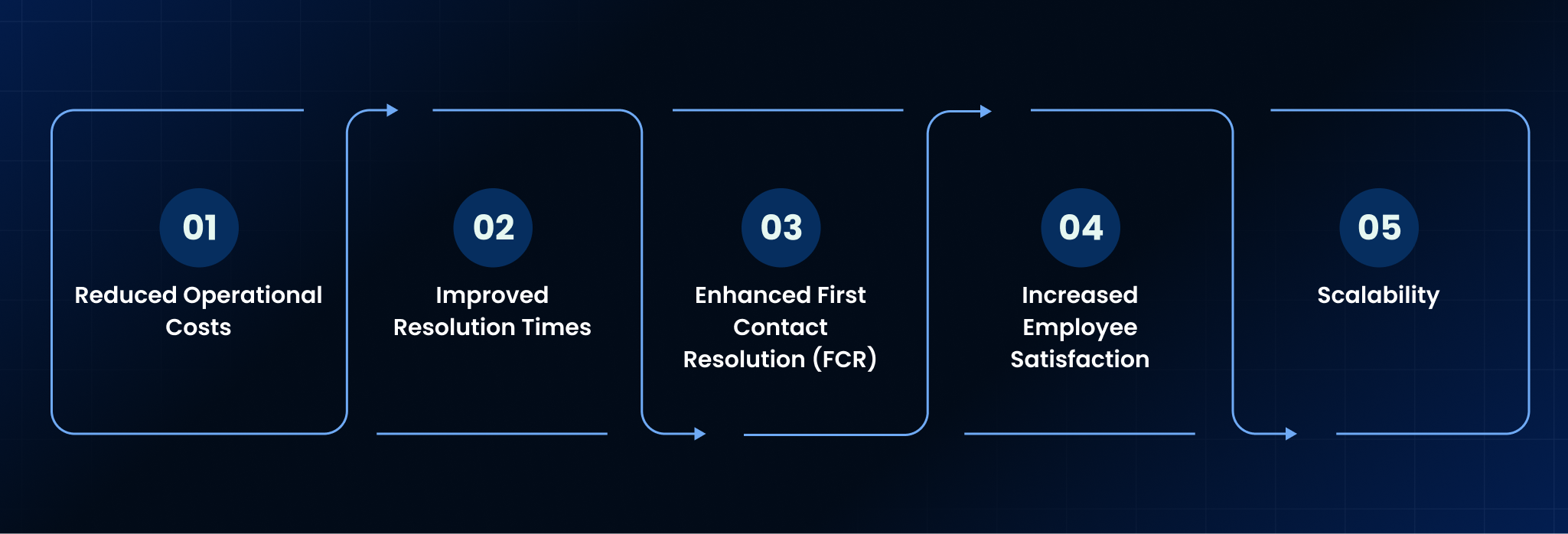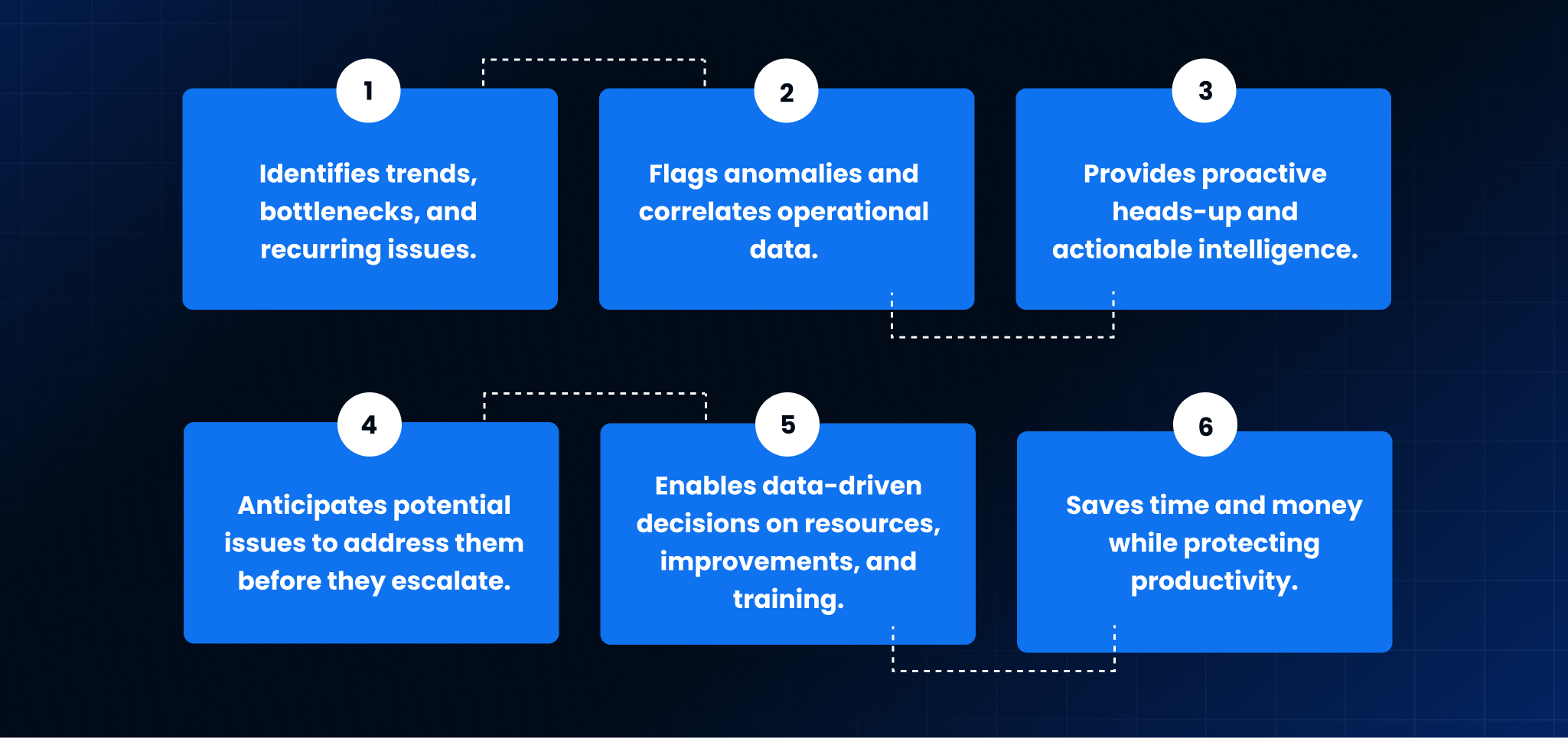Introduction
For technology leaders overseeing the nerve center of large US companies , the ticketing systems for IT, HR, and Finance , the conversation around AI automation is no longer just a trend; it’s a strategic imperative for 2025. We’re moving past simple scripts and into an era where intelligent systems can truly understand, act, and even predict. As you navigate the complexities of enhancing operational efficiency and employee experience, embracing the right kind of AI automation can be the catalyst that shifts your support functions from reactive cost centers to proactive value drivers.
Understanding AI Automation in the Enterprise Context
At its core, AI automation in the enterprise means leveraging artificial intelligence to handle tasks that traditionally required human intervention, especially within high-volume, repetitive processes like ticketing. However, the 2025 landscape demands more than just basic automation. We’re talking about sophisticated AI agents that can interpret nuanced requests, access multiple systems for information, and execute complex workflows without constant human oversight. Think of it less as a simple tool and more as a highly capable digital team member, constantly learning and improving. This isn’t just about reducing headcount; rather, it’s about elevating the human workforce to focus on more strategic, high-value tasks that truly move the needle for your business.
How AI Automation Streamlines Business Workflows
The impact of AI automation on business workflows is profound and immediate. For example, consider an employee needing a new software license. Traditionally, this might involve submitting a ticket, an agent manually verifying eligibility, another agent provisioning the license, and finally, a notification being sent. With intelligent AI automation, the process transforms: the employee makes a request, the AI agent instantly verifies their role and permissions, automatically initiates the provisioning workflow across relevant systems, and informs the employee when the software is ready , all without a human touching the ticket.
Similarly, in HR, a common request like “How do I update my direct deposit information?” can be fully handled by an AI agent that guides the employee through the process, even linking directly to the necessary portal. This streamlined approach minimizes wait times, reduces errors, and frees up your valuable IT, HR, and Finance teams from mundane, transactional tasks. Consequently, these teams can dedicate their expertise to complex problem-solving, strategic initiatives, and improving overall service delivery.
Enhancing Decision-Making with Intelligent Automation
Beyond simply automating tasks, intelligent AI automation provides an invaluable layer of insight that significantly enhances decision-making. By continuously processing vast amounts of ticket data, AI systems can identify trends, bottlenecks, and recurring issues that might otherwise go unnoticed. For instance, if an unusual spike in “network connectivity” tickets appears after a recent software update, the AI can flag this anomaly. Moreover, it can correlate this with other operational data, providing your teams with a proactive heads-up and actionable intelligence to prevent widespread outages.
This predictive capability is a game-changer. Instead of reacting to problems after they’ve impacted your workforce, AI automation enables your leadership to anticipate potential issues and address them before they escalate. You can make data-driven decisions about resource allocation, system improvements, and even training needs for your employees, based on real-time insights from your support ecosystem. Therefore, this strategic foresight not only saves time and money but also protects your organization’s productivity.
AI Automation for Employee Productivity and Engagement
A crucial, yet often overlooked, benefit of robust AI automation is its positive impact on employee productivity and engagement. When employees can get quick, accurate answers to their IT, HR, or Finance questions through an intelligent AI agent, they spend less time waiting and more time focused on their core responsibilities. Imagine the frustration of an employee whose laptop crashes, and they have to wait hours for a human agent. An AI agent, however, can immediately guide them through troubleshooting steps or even initiate a replacement order, minimizing downtime.
Furthermore, for your support teams, AI automation removes the tedium of answering repetitive questions. This allows them to tackle more complex, interesting challenges, leading to increased job satisfaction and reduced burnout. When your most skilled agents are freed from the mundane, they can apply their expertise where it truly matters, leading to more meaningful work and a stronger sense of purpose. Ultimately, this contributes to a more engaged and productive workforce across the entire organization.
Measuring ROI and Performance of AI Automation Initiatives
For any technology leader, proving the Return on Investment (ROI) of new initiatives is paramount. When it comes to AI automation, the financial and operational benefits are tangible and measurable. We’re talking about significant improvements in key performance indicators that directly impact your bottom line.
Here’s what you should expect to measure:
- Reduced Operational Costs: By deflecting a large percentage of routine tickets to AI agents, you can significantly lower the cost per ticket. This includes reduced labor costs associated with manual resolution and operational overhead.
- Improved Resolution Times: AI agents offer instant responses and often resolve issues in seconds, drastically cutting down Mean Time to Resolution. This translates to less downtime for employees and increased productivity.
- Enhanced First Contact Resolution (FCR): An effective AI agent can resolve many issues on the first interaction, eliminating the need for back-and-forth communication and escalations.
- Increased Employee Satisfaction: By providing quick, always-on support, AI automation improves the overall employee experience, leading to higher satisfaction scores.
- Scalability: As your company grows, an AI-powered system can handle increased ticket volumes without the need for proportional increases in human staff.
To truly understand your ROI, it’s essential to establish clear baseline metrics before implementation and consistently track these KPIs post-deployment. Look for comprehensive reporting capabilities that demonstrate these improvements over time, providing clear evidence of the value AI automation brings to your enterprise.

How Leena AI Drives Enterprise Efficiency Through Autonomous Automation
At Leena AI , we understand the unique challenges faced by technology leaders in large enterprises. Our pioneering approach focuses on Agentic AI to deliver autonomous automation across IT, HR, and Finance ticketing. Unlike traditional chatbots that follow rigid scripts, our AI agents are designed to understand complex employee queries, reason through solutions, and autonomously act across multiple enterprise systems to resolve issues end-to-end.
Imagine an IT scenario where an employee requests a new software installation. Our Agentic AI doesn’t just provide instructions; it verifies the employee’s permissions, interacts with your software provisioning system, initiates the installation, and confirms completion , all on its own. It’s like having a highly competent, perpetually learning virtual agent available 24/7. This robust capability significantly reduces manual workload for your teams, ensures consistent and accurate resolutions, and empowers your employees with instant self-service.
By focusing on these sophisticated, autonomous capabilities, Leena AI enables enterprises to achieve unparalleled efficiency, allowing your human teams to dedicate their expertise to strategic projects and critical problem-solving, rather than repetitive ticket handling. We believe this is the future of enterprise support, driven by the power of true AI automation.
Frequently Asked Questions
What exactly is AI automation in the context of enterprise support?
AI automation in enterprise support refers to using artificial intelligence technologies to automatically handle and resolve common employee requests and issues across IT, HR, and Finance ticketing systems, minimizing human intervention.
How does AI automation differ from traditional process automation?
While traditional process automation follows predefined rules, AI automation is more intelligent. It can understand natural language, learn from data, make decisions, and even perform complex, multi-step actions autonomously, adapting to new situations.
What are the main benefits of implementing AI automation for large companies?
Large companies can benefit from AI automation through reduced operational costs, faster resolution times, improved employee satisfaction, enhanced decision-making via predictive insights, and the ability to scale support services efficiently.
Can AI automation replace my entire IT or HR support team?
No, AI automation is designed to augment, not replace, your human teams. It handles routine tasks, freeing up your skilled professionals to focus on complex problems, strategic initiatives, and personalized employee interactions that require human empathy and judgment.
What should I look for when choosing an AI automation solution for my enterprise?
Look for a solution that offers genuine Agentic AI capabilities, strong integration with your existing enterprise systems, proven ROI, robust security and compliance features, and a clear path for scaling across different departments like IT, HR, and Finance.
How quickly can we expect to see ROI from AI automation?
While implementation timelines vary, many enterprises begin to see measurable ROI from AI automation within the first 6 to 12 months, particularly in areas like reduced ticket volume, faster resolution, and improved agent productivity.
Is data security a concern with AI automation?
Data security is paramount. Any reputable AI automation provider will offer enterprise-grade security, data privacy, and compliance measures. It’s crucial to choose a solution that adheres to industry standards and best practices for protecting sensitive employee and company information.














